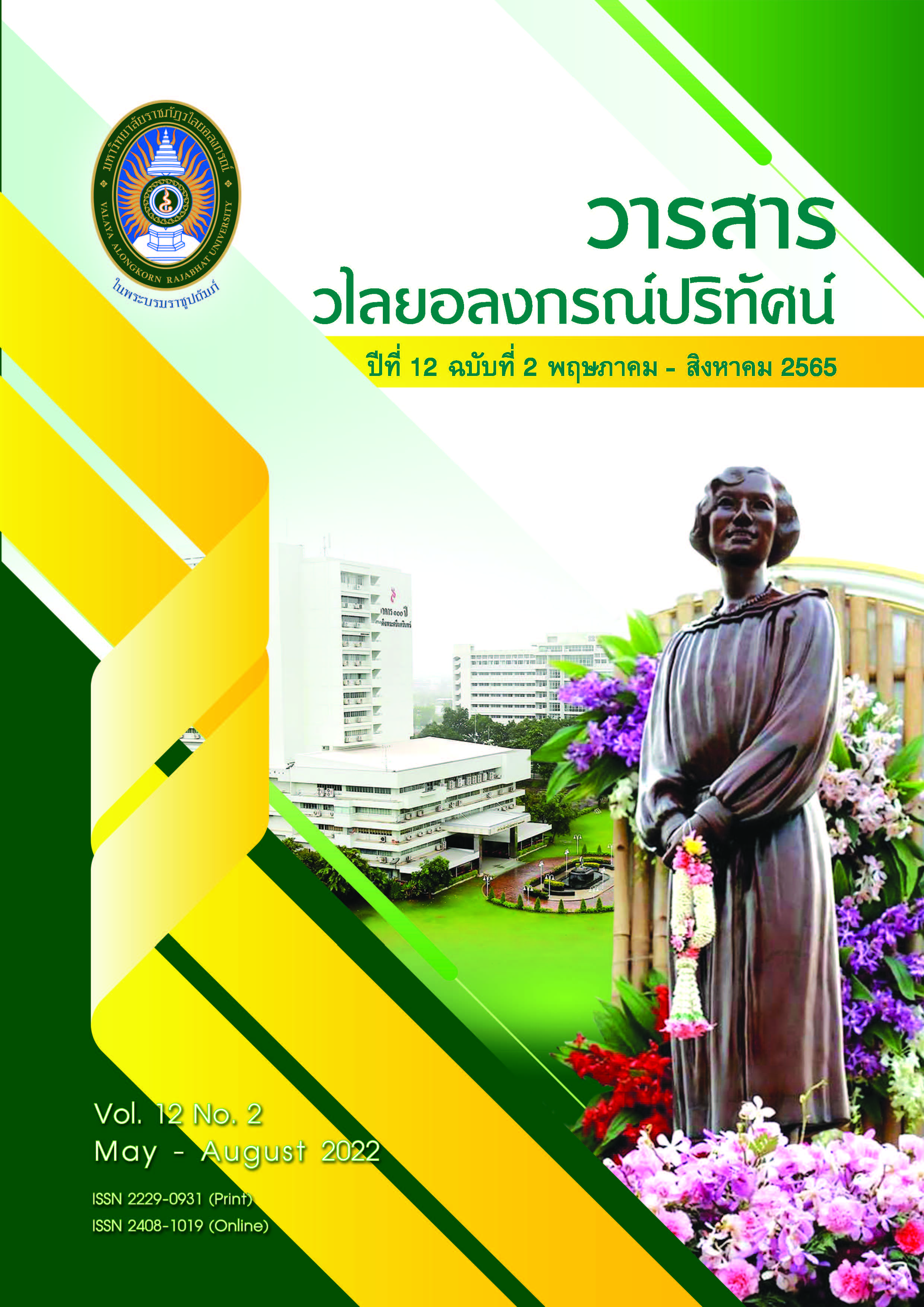การศึกษากลยุทธ์การเขียนและความสามารถในการเขียนของนักศึกษาชั้นปีที่ 3 รายวิชาภาษาอังกฤษเพื่อการสื่อสารในสำนักงาน
คำสำคัญ:
กลยุทธ์การเขียน, ความสามารถในการเขียน, นักศึกษาระดับปริญญาตรีบทคัดย่อ
งานวิจัยนี้มีวัตถุประสงค์เพื่อ 1) ศึกษากลยุทธ์การเขียนภาษาอังกฤษธุรกิจของนักศึกษาระดับปริญญาตรี และ 2) ศึกษาความสามารถในการเขียนภาษาอังกฤษธุรกิจของนักศึกษาระดับปริญญาตรี กลุ่มตัวอย่าง คือ นักศึกษาชั้นปีที่ 3 ที่เรียนรายวิชาภาษาอังกฤษเพื่อการสื่อสาร ในสำนักงาน จำนวน 52 คน มหาวิทยาลัยราชภัฏวไลยอลงกรณ์ ในพระบรมราชูปถัมภ์ จังหวัดปทุมธานี ในภาคเรียนที่ 2 ปีการศึกษา 2564 การศึกษาเชิงสำรวจครั้งนี้เป็นแบบผสมผสาน เชิงปริมาณและคุณภาพ เครื่องมือวิจัยที่ใช้เก็บรวบรวมข้อมูลเชิงปริมาณ ได้แก่ แบบสอบถาม การใช้กลยุทธ์การเขียนภาษาอังกฤษ และ แบบทดสอบความสามารถในการเขียนภาษาอังกฤษธุรกิจ ซึ่งผ่านการตรวจสอบความตรงเชิงเนื้อหาและทดสอบหาค่าความเชื่อมั่นอยู่ที่ระดับ 0.83 การเก็บข้อมูลเชิงคุณภาพใช้แบบสัมภาษณ์และการสังเกตการณ์แบบมีส่วนร่วม ข้อมูลที่ได้นำมาวิเคราะห์ โดยใช้สถิติเชิงพรรณนาและเทคนิคการวิเคราะห์เนื้อหา
ผลการวิจัยพบว่า ในภาพรวมนักศึกษามีความสามารถในการเขียนอยู่ในระดับปานกลาง (ร้อยละ 58) และใช้กลยุทธ์การเขียนภาษาอังกฤษในระดับมาก (ค่าเฉลี่ย 3.57) เมื่อพิจารณาการใช้กลยุทธ์การเขียนเป็นรายด้าน นักศึกษาใช้กลยุทธ์ ขั้นแก้ไข (Revising) มากที่สุด (ค่าเฉลี่ย 3.62) และใช้กลยุทธ์ขั้นวางแผน (Planning) น้อยที่สุด (ค่าเฉลี่ย 3.49) ผลการศึกษานี้เสนอแนะว่าควรสนับสนุนให้ผู้เรียนฝึกใช้กลยุทธ์การเขียนด้านการวางแผน (Planning) อย่างเหมาะสมเพื่อช่วยพัฒนาทักษะความสามารถในการเขียนภาษาอังกฤษ
เอกสารอ้างอิง
Aluemalai, K. & Maniam, M. (2020). Writing Strategies Utilized by Successful and Unsuccessful ESL Undergraduate Students in Writing Classroom. Journal of English Language and Culture. 10(2), 100-110.
Arndt, V. (1987). Six Writers in Search of Texts: A Protocal-Based Study of L1 and L2 Writing. ELT Journal. 41, 257-267.
Bai, R., Hu, G., & Gu, Y. (2014). The Relationship between Use of Writing Strategies and English Proficiency in Singapore Primary Schools. The Asia-Pacific Education Researcher. 23(3), 355-365.
Beare, S. (2000). Differences in Content Generating and Planning Processes of Adult L1 ad L2 Proficient Writers. PhD Dissertation, University of Ottawa.
Boonyarattanasoontorn, P. (2017). An Investigation of Thai Students’ English Language Writing Difficulties and Their Use of Writing Strategies. Journal of Advanced Research in Social Sciences and Humanities. 2(2), 111-118.
Cohen, D. (1998). Strategies in Learning and Using a Second Language. Harlow, Essex: Longman.
Hsiao, Y. & Oxford, R. (2002). Comparing Theories of Language Learning Strategies: A Confirmatory Factor Analysis. The Modern Language Journal, 86(3), 368-383.
Krapels, A. (1990). An Overview of Second Language Writing Process Research. In B. Kroll (eds.), Second Language Writing: Research Insights for the Classrooms (pp.37-56). New York: Cambridge University Press.
Manchon, M., De Larios, R. & Murphy, L. (2007). A Review of Writing Strategies: Focus on Conceptualizations and Impact of First Language. In A. Cohen & E. Macaro (eds.), Language Learner Strategies: 30 Years of Research and Practice (pp.229-250). Oxford University Press.
Mohite, M. (2014). An Investigation into the English Language Writing Strategies Used by Polish EFL Secondary School Learners. British Council ELT Master’s Dissertation. London Metropolitan University.
Moqbali, I. (2020). Metacognitive Writing Strategies Used by Omani Grade Twelve Students. International Journal of Learning, Teaching and Educational Research. 19(8), 214-232.
Mu, C. (2005). A Taxonomy of ESL Writing Strategies. In Proceedings Redesigning Pedagogy: Research, Policy, Practice, (pp. 1-10). Singapore
Oxford, R. (1990). Language Learning Strategies: What Every Teacher Should Know. New York,: Newbury House.
Pawapatcharaudom, R. (2007). An Investigation of Thai Students’ English Language Problems and Their Learning Strategies in the International Program at Mahidol University. Master’s Thesis, King Mongkut’s Institute of Technology, Thailand.
Raimes, A. (1985). What Unskilled ESL Students Do as They Write: A Classroom Study of Composing. TESOL Quarterly. 19(2), 229-258.
Raooffi, S., Binandeh, M. & Rahmani, S. (2017). An Investigation into Writing Strategies and Writing Proficiency of University Students. Journal of Language Teaching and Research. 8(1), 191-198.
Rodsawang, S. (2017). Writing Problems of EFL Learners in Higher Education: A Case Study of the Far Eastern University. FEU Academic Review. 11(1), 268-284.
Sasaki, M. (2000). Toward an Empirical Model of EFL Writing Processes: An Exploratory Study. Journal of Second Language Writing. 9(3), 259-291.
Shi, H. (2017). Learning Strategies and Classification in Education. Institute for Learning Styles Journal, 1(Fall), 24-36.
Victori, M. (1995). EFL Writing Knowledge and Strategies: An Interactive Study. Doctoral Dissertation, Univeritat Autonoma de Barcelona, Barcelona, Spain.
Weigle, C. (2002). Assessing Writing. Cambridge: Cambridge University Press.
Wenden, L. (1991). Metacognitive Strategies in L2 Writing: A Case for Task Knowledge. pp.302-322. In Georgetown University Round Table on Language and Linguistics, edited by J. Alatis. Washington, D.C., WA: Georgetown University Press.
Williams, J. (2005). Teaching Writing in Second and Foreign Language Classrooms. New York: McGraw-Hill.
Zhang, J. & Qin, L. (2018). Validating a Questionnaire on EFL Writers’ Metacognitive Awareness of Writing Strategies in Multimedia Environments. In A. Haukas, C. Bjorke, & M. Dypedahl (eds.). Metacognition in Language Learning and Teaching (pp. 157-177). London, England: Routledge (Taylor & Francis Group).
ดาวน์โหลด
เผยแพร่แล้ว
รูปแบบการอ้างอิง
ฉบับ
ประเภทบทความ
สัญญาอนุญาต
ลิขสิทธิ์ (c) 2022 ธนกร สุวรรณพฤฒิ

อนุญาตภายใต้เงื่อนไข Creative Commons Attribution-NonCommercial-NoDerivatives 4.0 International License.
ข้อความที่ปรากฏในบทความแต่ละเรื่องในวารสารวไลยอลงกรณ์ปริทัศน์ เป็นความคิดเห็นของผู้นิพนธ์แต่ละท่าน มิใช่เป็นทัศนะและมิใช่ความรับผิดชอบของกองบรรณาธิการจัดทำวารสาร และ
มหาวิทยาลัยราชภัฏวไลยอลงกรณ์ ในพระบรมราชูปถัมภ์


